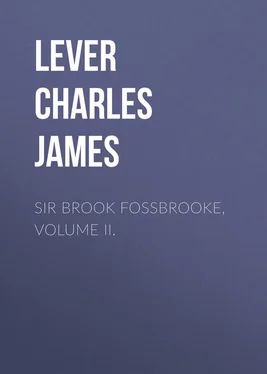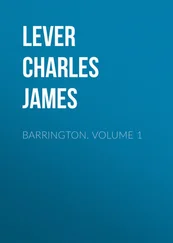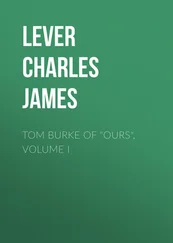Charles Lever - Sir Brook Fossbrooke, Volume II.
Здесь есть возможность читать онлайн «Charles Lever - Sir Brook Fossbrooke, Volume II.» — ознакомительный отрывок электронной книги совершенно бесплатно, а после прочтения отрывка купить полную версию. В некоторых случаях можно слушать аудио, скачать через торрент в формате fb2 и присутствует краткое содержание. Жанр: literature_19, foreign_antique, foreign_prose, на английском языке. Описание произведения, (предисловие) а так же отзывы посетителей доступны на портале библиотеки ЛибКат.
- Название:Sir Brook Fossbrooke, Volume II.
- Автор:
- Жанр:
- Год:неизвестен
- ISBN:нет данных
- Рейтинг книги:4 / 5. Голосов: 1
-
Избранное:Добавить в избранное
- Отзывы:
-
Ваша оценка:
- 80
- 1
- 2
- 3
- 4
- 5
Sir Brook Fossbrooke, Volume II.: краткое содержание, описание и аннотация
Предлагаем к чтению аннотацию, описание, краткое содержание или предисловие (зависит от того, что написал сам автор книги «Sir Brook Fossbrooke, Volume II.»). Если вы не нашли необходимую информацию о книге — напишите в комментариях, мы постараемся отыскать её.
Sir Brook Fossbrooke, Volume II. — читать онлайн ознакомительный отрывок
Ниже представлен текст книги, разбитый по страницам. Система сохранения места последней прочитанной страницы, позволяет с удобством читать онлайн бесплатно книгу «Sir Brook Fossbrooke, Volume II.», без необходимости каждый раз заново искать на чём Вы остановились. Поставьте закладку, и сможете в любой момент перейти на страницу, на которой закончили чтение.
Интервал:
Закладка:
I can no more trace him through this wandering explanation than I dare ask my reader to follow. It was wild, broken, and discursive. Now interrupted by protestations of innocence, now dashed by acknowledgments of sorrow, who knows if his unartistic story did not serve him better than a more connected narrative, – there was such palpable truth in it!
Nor was Lucy less disposed to leniency that he who pleaded before her was no longer the rich heir of a great estate, with a fair future before him, but one poor and portionless as herself. In the reserve with which he shrouded his quarrel with his family, she fancied she could see the original cause, – his love for her; and if this were so, what more had she need of to prove his truth and fidelity? Who knows if her woman’s instinct had not revealed this to her? Who knows if, in that finer intelligence of the female mind, she had not traced out the secret of the reserve that hampered him, of the delicate forbearance with which he avoided the theme of his estrangement from his family? And if so, what a plea was it for him! Poor fellow, thought she, what has he not given up for me!
Rich men make love with great advantages on their side. There is no doubt that he who can confer demesnes and diamonds has much in his favor. The power that abides in wealth adds marvellous force to the suitor’s tale; but there is, be it owned, that in poverty which, when allied with a sturdy self-dependence, appeals wonderfully to a woman’s mind. She feels all the devotion that is offered her, and she will not be outdone in generosity. It is so fine of him, when others care for nothing but wealth and riches, to be satisfied with humble fortune, and with me! There is the summing up, and none need be more conclusive.
How long Trafford might have gone on strengthening his case, and calling up fresh evidence to his credit, – by what force of words he might still have sustained his character for fidelity, – there is no saying; but his eloquence was suddenly arrested by the sight of Cave and Tom coming to meet them.
“Oh, Lucy,” cried he, “do not quit my arm till you tell me my fate. For very pity’s sake, do not leave me in the misery of this anxiety,” said he, as she disengaged herself, affecting to arrange her shawl.
“I have a word to say to my brother,” said she, hurriedly; “keep this sprig of jasmine for me. I mean to plant it somewhere;” and without another word she hastened away and made for the house.
“So we shall have to sail at once, Trafford,” said Cave. “The Admiral has sent over the ‘Gondomar’ to fetch us; and here’s a lieutenant with a despatch waiting for us at the cottage.”
“The service may go – No, I don’t mean that; but if you sail to-morrow you sail without me.”
“Have you made it all right?” whispered Tom in his ear.
“I ‘m the happiest fellow in Europe,” said he, throwing his arm round the other’s shoulder. “Come here, Tom, and let me tell you all – all.”
CHAPTER VI. HOW CHANGED
We are once more at the Priory; but how changed is it all! Billy Haire himself scarcely recognizes the old spot, and indeed comes now but seldom to visit it; for the Chief has launched out into the gay world, and entertains largely at dinner, and even gives déjeuners dansants , – foreign innovations at which he was wont to inveigh with vehemence.
The old elm under whose shade Avonmore and the wits used to sit of an evening, beneath whose leafy canopy Curran had jested and Moore had sung, was cut down, and a large tent of gaudy blue and white spread its vulgar wings over innumerable breakfast-tables, set forth with what the newspapers call every delicacy of the season.
The Horatian garden, and the Roman house – conceits of an old Lord Chancellor in former times, and once objects of almost veneration in Sir William’s eyes – have been swept away, with all their attendant details of good or bad taste, and in their place a fountain has been erected, for whose aquatic displays, be it noted in parenthesis, two horses and as many men are kept in full employ. Of the wild old woodland walks – shady and cool, redolent of sweet-brier and honeysuckle – not a trace remains; driving-roads, wide enough for a pony-carriage, have been substituted for these, and ruthless gaps in the dense wood open long vistas to the eye, in a spot where once it was the sense of enclosure and seclusion that imparted the chief charm. For so it is, coming out of the din and bustle of a great city, there is no attraction which can vie with whatever breathes of tranquillity, and seems to impart peace by an air of unbroken quiet. It was for this very quality the Priory had gained its fame. Within doors the change was as great as without. New, and, be it admitted, more comfortable furniture had replaced the old ponderous objects which, in every form of ugliness, had made the former decorations of the rooms. All was now light, tasteful, elegant. All invited to ease of intercourse, and suggested that pleasant union of social enjoyment with self-indulgence which our age seems to cultivate. But of all the changes and mutations which a short time had effected, none could compete with that in the old Chief himself. Through life he had been studiously attentive to neatness and care in his dress; it was with something of pride that he exhibited little traits of costume that revived bygone memories; and his long white hak, brushed rigidly back, and worn as a queue behind, and his lace ruffles, recalled a time when these were distinctive signs of class and condition.
His sharply cut and handsome features were well served by the well-marked temples and lofty head that surmounted them, and which the drawn-back hair displayed to full advantage; and what a terrible contrast did the expression present when a light-brown wig covered his head, and a lock of childlike innocence graced his forehead! The large massive eyebrows, so impressive in their venerable whiteness, were now dyed of a dark hue; and to prevent the semblance of ghastliness which this strong color might impart to the rest of the face, a faint tinge of rouge was given to the cheek, thus lending to the whole features an expression of mingled smirk and severity as little like the former look of dignified intelligence as might be.
A tightly fitting frock-coat and a colored cravat, fastened with a massive jewelled pin, completed a travesty which, strange to say, imparted its character to his gait, and made itself evident in his carriage.
His manner, too, – that admirable courtesy of a bygone day, of which, when unprovoked by a personal encounter, he was a master, – was now replaced by an assumed softness, – an ill-put-on submission that seemed to require all his watchfulness never to forget.
If his friends deplored and his enemies exulted over this unbecoming change in one who, whatever his defects, had ever displayed the force and power of a commanding intellect, the secret was known to few. A violent and unseemly attack had been made in the “House” against him by some political partisan, who alleged that his advanced age and failing faculties urgently demanded his retirement from the Bench, and calling loudly on the Government to enforce a step which nothing but the tenacity and obstinacy of age would have refused to accept voluntarily and even gratefully.
In the discussion – it was not debate – that the subject gave rise to, the year of his birth was quoted, the time he had been first called, and the long period he had served on the Bench; and if his friends were strong in their evidences of his unfailing powers and unclouded faculties, his assailants adduced instances in which he had mistaken the suitors and misstated the case. His temper, too, imperious even to insult, had, it was said, driven many barristers from his court, where few liked to plead except such as were his abject and devoted followers.
Читать дальшеИнтервал:
Закладка:
Похожие книги на «Sir Brook Fossbrooke, Volume II.»
Представляем Вашему вниманию похожие книги на «Sir Brook Fossbrooke, Volume II.» списком для выбора. Мы отобрали схожую по названию и смыслу литературу в надежде предоставить читателям больше вариантов отыскать новые, интересные, ещё непрочитанные произведения.
Обсуждение, отзывы о книге «Sir Brook Fossbrooke, Volume II.» и просто собственные мнения читателей. Оставьте ваши комментарии, напишите, что Вы думаете о произведении, его смысле или главных героях. Укажите что конкретно понравилось, а что нет, и почему Вы так считаете.












